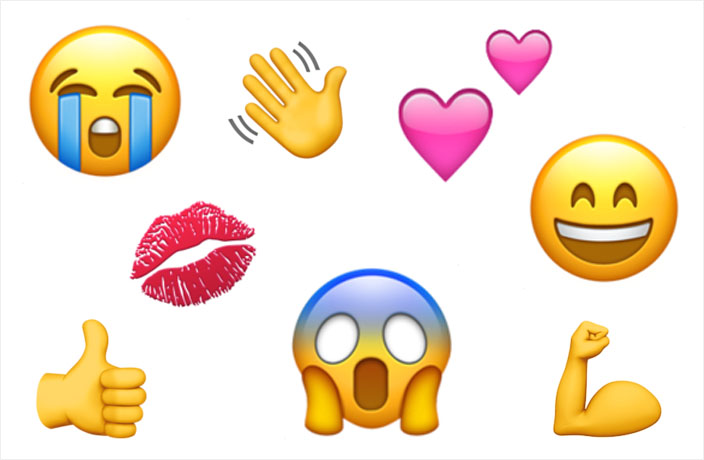As China enthusiasts and linguists discuss the future of Chinese characters, the country's youth are already well ahead, coming up with their own rich dictionary of online slang. It’s not only a means to simplify and update the Chinese language, but also a natural and fun way to respond to current events on social media. There are numbers, acronyms, contractions, stickers and more… A lot, basically. We picked out a few (old and new) to help you become a NB, 3Q88.
Numbers: Online streaming and ACG (Anime, Comic and Games) subculture
233
(verb)
... means laughing, LOL or :D and has a more esoteric origins than other numeric slang. It refers to emoticon no. 233 from the online forum mop.com (a Chinese website popular with gamers). Emoticon no. 233 is a pixelated orange animal laughing so hard it bounces and slams its fist on the ground. Now, 233 has evolved to express not only laughter but also hatred, impatience and dislike, which should be clear according to the context in which it’s used. Users can add extra 3333 for emphasis.
E.g. 233, I’ve gotten into a relationship; I got an A on my exam, 233.
6666
liù liù liù 六六六 (expression)
… is often used by gamers and commenters on live streaming platforms. According to legend (er, Baidu) it originates from Chinese League of Legends gamers who first used the number 6 to show respect, kind of like a ‘well-played.’ It sounds like liū (溜) which means to be adept.
Numbers: Phonetically speaking
88
bā bā八八 (expr.)
… pretty self-explanatory. If you don’t get it, we’re done here, ‘Bye bye!’ (bāibāi 拜拜)
555
wǔwǔwǔ 五五五 (v.)
… sounds like 呜呜呜 (wūwūwū) , which is the onomatopoeic sound of crying or whimpering.
748
qīsìbā 七四八 (expr.)
… sounds like qùsǐba (去死吧) which literally translates to ‘go die.’ Any creative interpretation of this is acceptable (e.g. ‘Go to hell!’ ‘Drop dead!’).
520
wǔ èr líng 五二零 (expr.)
… sounds like ‘I love you’ (in Chinese; 我爱你 wǒ ài nǐ), it’s so basic it even spawned its own make-shift holiday (for Taobao and Tmall purposes anyway). Ah, May 20 (520), the quasi-Valentine’s day for Chinese lovers – because February 14 just isn’t enough.
3Q88
sān Q bā bā 三Q八八 (expr.)
… it contains both numbers and capital letters (next level shit right here), but 3Q88 is actually just another phonetic phrase, meaning ‘thank you, bye bye.’
Acronyms: Everyday Use
Like numeric slang, capital letter acronyms reduce the number of keystrokes required to write a word.
GG/JJ
(n.)
… GG stands for gege (哥哥) which means older brother; while the female equivalent is JJ (jiejie, 姐姐) for older sister.
ZF
(n.)
… stands for zhèngfǔ (政府): the government.
PPMM
(PiàoPiàoMěiMéi): 漂漂美眉 (n.)
… while MM (MěiMéi) means pretty girl, the addition of PP (PiàoPiào: really pretty) in front turns the description into the equivalent of a Sean Kingston song (‘beautiful girl’).
NB / 牛B
(n.)
… niúbī(牛逼), literally ‘cow c***,’ means something (or someone) that is awesome. Somewhat akin to saying ‘fucking cool’ in English.
Acronyms: NSFW
ML / KJ / GC
(v.)
… Make Love, KǒuJiāo (口交), GāoCháo (高潮) mean sex, oral sex and orgasm.
SB
(n.)
… stands for shǎbī (傻逼), i.e. stupid c***, which, contrary to casual British usage, is actually pretty damn offensive in China. Use with caution.
TMD
(expr.) tāmāde (他妈的)
... means ‘fucking’ (as in ‘fucking landlord!’) or ‘damn it!’ (It literally means ‘his mother.’)
YP
(v.) yuē pào (约炮)
... translates to casual sex or one-night stand.
PG
(n.) pìgu (屁股)
... means buttocks.
Character-ture: Contractions
亲
qīn (n.)
… is short for 亲爱的 (qīnaìde). It means loved one or ‘dear,’ however its usage is now as ubiquitous as Stan Smith x Adidas sneakers or Fjallraven backpacks. Everybody calls you 亲. The random lady whose QR code you were forced to scan while waiting for the subway last week (whose new restaurant you are definitely not going to visit), the friend-of-a-friend you met last Saturday, the potential love interest sending you mixed emojis on WeChat. It’s the same as how laowai use ‘x’ at the end of messages or call each other ‘babe.’
矮丑穷
ǎi chǒu qióng (adj.)
… means short, ugly and poor. It is the opposite of the ‘ideal boyfriend’ (tall, handsome and rich; gāofùshuài 高富帅).
白富美
báifùměi (adj.)
… is the female equivalent of 高富帅. It means white, rich and beautiful, because that’s the ‘ideal girlfriend,’ apparently.
不作不死
bùzuò bùsǐ (expr.)
… literally means ‘don’t do, don’t die’ (but is usually more humorously said as ‘NO ZUO NO DIE’), which means that one will not find trouble if one does not seek it out (#deep). The full expression is 不作死就不会死 (bù zuòsǐ jiù bù huìsǐ) and is used to dissuade someone from doing something they ought not.
Character-ture: Pop culture
吓死宝宝了
Xià sǐ bǎobǎo le (expr.)
… means ‘that really scares me’ and was used by actor Wang Baoqiang (of the recent divorce and cheating scandal) in the TV show Running Man. Xiasi means ‘scared to death’ and baobao means ‘baby,’ although here it refers to one's self. So, if you think you’re pretty cute and like referring to yourself in third person, use this one! (Note: verb + baobao le can be used in general, anytime you want to refer to yourself as a baby.)
我已使出洪荒之力
Wǒ yǐ shǐ chū hónghuāng zhī lì (expr.)
… started trending on Weibo after it was adorably spoken by #TeamChina swimmer Fu Yuanhui in her Rio Olympics 2016 post-race interview. It means ‘I’ve resorted to using primordial powers!’
红红火火恍恍惚惚
hónghóng huǒhuǒ huǎnghuǎng hūhū (onomatopoeia)
… is the awkward mutterings of a socially-inept person at a party full of gaofushuai and baifumei; the equivalent of putting one’s foot in one’s mouth or being tongue-tied, if you will.
E.g. You: Do you like… stuff? Cool Person: -death stare- You: HHHH [walk away slowly]
For more social media slang, check out our monthly ‘Chinese Urban Dictionary’ column.






















0 User Comments